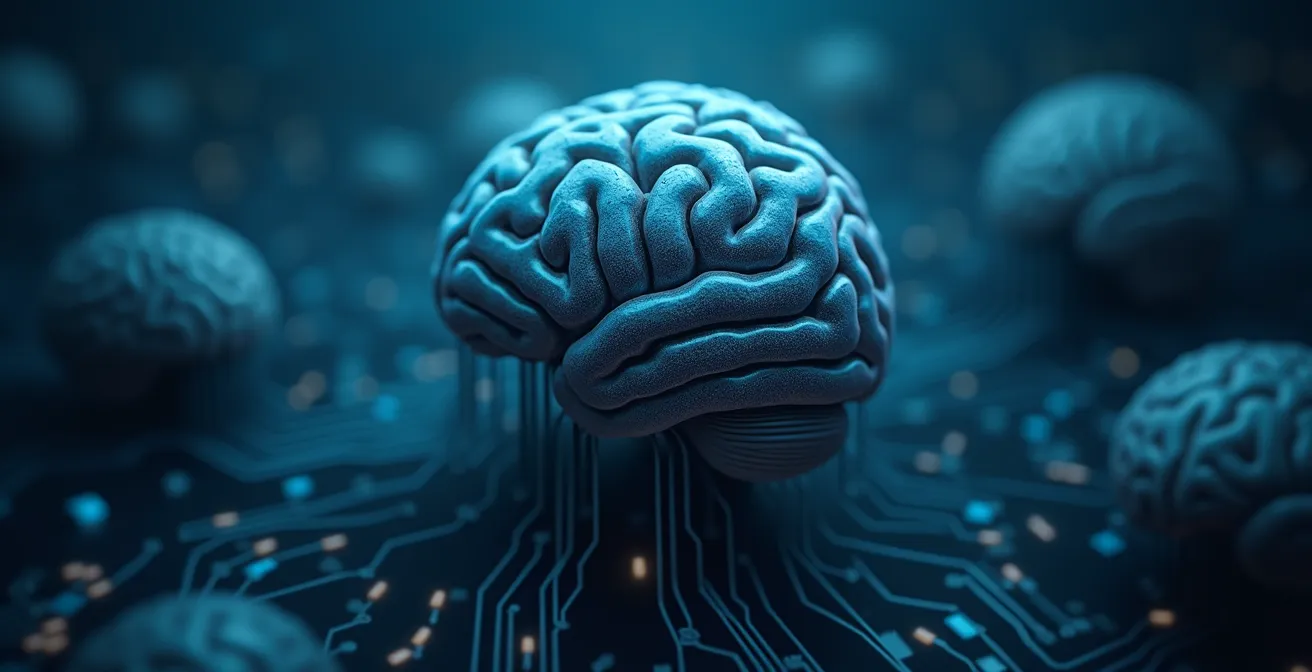The feeling of being perpetually overwhelmed is an all-too-common reality for many women. It’s not just about a long to-do list; it’s the invisible, relentless cognitive effort of managing schedules, anticipating needs, and making countless daily decisions. This “mental load” acts as a constant drain on cognitive resources, leading to brain fog, forgetfulness, and fatigue. While some may look for powerful medicines for concentration, the first step is to understand the unique pressures on the female brain. Addressing this cognitive burden requires a nuanced strategy where targeted supplements can play a vital supportive role, not as a quick fix, but as part of a holistic approach to reclaiming mental clarity and resilience.
Your Brainpower Blueprint in 5 Key Points
- The Mental Load is Real: Acknowledge the unique cognitive burden on women, which impacts memory and focus.
- Hormones Matter: Understand how hormonal fluctuations throughout life directly affect brain function.
- Targeted Nutrition Works: Discover supplements like adaptogens and Omega-3s that specifically support female cognitive health.
- Synergy is Everything: Learn how to combine supplements with lifestyle changes for maximum benefit.
- Informed Choices are Power: Differentiate between supportive supplements and prescription medications to make educated decisions.
Understanding the female brain’s unique cognitive demands
The cognitive challenges many women face are not imagined; they are rooted in a combination of societal expectations and distinct biological factors. The concept of “mental load” refers to the often-unseen work of managing and organizing daily life, a burden that disproportionately falls on women. This constant multitasking and planning contributes significantly to cognitive fatigue, as research indicates women perform an average of 10 hours/week of additional unpaid work, impacting their executive function.
What is the mental load?
The mental load is the invisible, cognitive labor involved in managing household and family responsibilities, from planning meals and scheduling appointments to remembering birthdays. It’s a constant background process that consumes mental energy.
This societal pressure is compounded by physiological realities. Hormonal fluctuations throughout a woman’s life—from the monthly menstrual cycle to the significant shifts of perimenopause and menopause—directly influence neurotransmitters. These changes can affect focus, memory recall, and overall energy levels, often manifesting as “brain fog,” a state of mental confusion and lack of clarity. This isn’t a personal failing but a biological response to changing internal chemistry and external stressors.
Study on women’s mental load and cognitive fatigue
Research shows that women experience significant mental fatigue due to managing multiple concurrent tasks both at work and home, leading to reduced executive function and impaired focus.
The image below conceptually represents this state of cognitive depletion, where the brain’s resources feel dimmed and strained, operating in a “low power mode” to conserve energy amidst overwhelming demands.

This visual metaphor captures the essence of brain fog and mental exhaustion. It highlights the necessity of moving beyond generic brain health advice to adopt strategies that specifically address these female-centric challenges. Setting realistic expectations is crucial; supplements are not a cure for burnout but can be powerful allies in reinforcing the brain’s resilience against these pressures.
“We need to ensure myths don’t lay the groundwork for overburdening women, leading to a more pronounced executive drain.”
– Dr Faye Begeti, Low power mode: the brain impact of women’s mental load
Targeted supplements: Beyond general cognitive enhancement
Rather than seeking a single “magic pill,” a more effective approach is to use specific nutrients that target the underlying causes of cognitive fatigue in women. This means focusing on stress resilience, neuronal health, and fundamental energy production. Adaptogens, for example, are a class of herbs that help the body adapt to and resist physical, chemical, and biological stress.
Key among these is Ashwagandha, which has been studied for its ability to modulate the body’s stress response, thereby helping to mitigate the cognitive fog that often accompanies chronic stress. Similarly, Omega-3 fatty acids, particularly DHA and EPA, are fundamental building blocks for brain cells. They are crucial for maintaining neuronal health and supporting cognitive function, especially during periods of hormonal transition when the brain is more vulnerable to inflammation and oxidative stress.
The following image highlights some of these natural compounds, representing the shift towards targeted, nature-derived support for cognitive well-being.
Beyond these, essential micronutrients play a foundational role. B vitamins and Magnesium are indispensable co-factors in the body’s energy production cycle and are vital for synthesizing neurotransmitters like serotonin and dopamine, which regulate mood and focus. As research from Mónika Fekete and colleagues suggests, B vitamins are particularly crucial in maintaining cognitive function during aging. Emerging ingredients like L-Theanine, often found in green tea, can also promote a state of calm alertness, making it a useful tool for enhancing focus without the jitteriness of stimulants.
Integrating supplements into a woman’s daily cognitive management strategy
Supplements achieve their greatest effect not in isolation, but as part of a comprehensive strategy for cognitive well-being. Their benefits are amplified when combined with foundational lifestyle factors such as adequate sleep, a balanced diet, and regular exercise. This holistic approach is the cornerstone of effectively managing the daily mental load and building long-term cognitive resilience.
For those looking to integrate these tools, a structured approach is beneficial. The following checklist offers practical steps to ensure supplements are used effectively:
- Take supplements with meals for better absorption
- Combine adaptogens with stress management practices
- Schedule omega-3 intake consistently daily
- Consult healthcare provider for personalized dosing
Timing can also significantly influence a supplement’s effectiveness. Aligning intake with your body’s natural rhythms and daily demands can optimize the desired cognitive benefits. The table below provides a general framework for scheduling key supplements.
| Supplement | Recommended Timing | Benefit |
|---|---|---|
| Omega-3 Fatty Acids | With meals | Improved absorption and sustained cognitive function |
| L-Theanine + Caffeine | Morning or early afternoon | Enhanced focus and alertness without jitters |
| B Vitamins | Morning | Supports energy production and neurotransmitter function |
| Magnesium | Evening | Supports relaxation and sleep quality |
Ultimately, the most effective regimen is a personalized one. Factors such as your life stage (e.g., postpartum, perimenopause), specific symptoms (e.g., anxiety, poor memory), and overall health goals should guide your choices. Finding the right combination is key to both professional success and personal well-being. Learn more about how you can Balance career and family life through strategic daily management.
Personalized supplement regimens improve cognitive resilience in women
Personalized vitamin subscription services combining omega-3 DHA, B vitamins, and calcium show enhanced cognitive benefits tailored to women’s life stages and symptoms.
Key Takeaways
- Women’s cognitive health is uniquely impacted by the mental load and hormonal changes throughout life.
- Supplements should target specific needs like stress resilience (adaptogens) and neuronal health (Omega-3s).
- Maximum benefits are achieved when supplements are integrated with healthy lifestyle habits like sleep and nutrition.
- Consulting a healthcare professional is crucial before starting any new supplement regimen, especially for persistent cognitive issues.
Bridging the gap: Supplements vs. ‘concentration medicines’ for women
It’s vital to distinguish between dietary supplements and prescription “medicines for concentration.” The latter are pharmaceuticals developed to treat specific medical conditions like ADHD and are subject to rigorous testing and regulatory oversight by health authorities. Supplements, on the other hand, fall into a different category with less stringent regulation, which can create confusion and potential risks for consumers. A significant portion of the public, including approximately 25% of adults over 50 taking brain supplements, may be using products without proven efficacy.
Comparison of prescription cognitive medications vs supplements
Prescription medicines have regulatory oversight and clear indications, while supplements lack strong evidence and regulation, leading to caution in their use for cognitive challenges.
The primary differences lie in efficacy, side effects, and oversight. Prescription medications have proven mechanisms of action for their indicated use, but can also come with significant side effects. Supplements often have a broader, more supportive role and generally a milder safety profile, but their effectiveness can vary widely, and the market is not without its dangers.
“Over-the-counter cognitive supplements may contain unapproved pharmaceutical drugs which pose serious safety risks.”
– Pieter Cohen, Harvard Medical School, New research finds unapproved drugs in brain-boosting supplements
Recognizing when to seek professional medical advice is paramount. While supplements can support general cognitive health, certain signs warrant a consultation with a healthcare provider. The following checklist can help identify situations where medical evaluation is necessary beyond supplementation.
When to consult a healthcare professional
- Persistent memory loss affecting daily life
- Difficulty maintaining focus despite lifestyle changes
- Cognitive decline impacting work or social relationships
- Considering pharmaceutical cognitive medicines
Ultimately, the goal is to empower women to make informed choices. By understanding the distinct roles of both supplements and medications, women can work with healthcare professionals to build a holistic and safe strategy to support their cognitive health through every stage of life.
Frequently asked questions on cognitive health women
Can supplements alone cure brain fog?
No, supplements cannot cure brain fog on their own. They are most effective as part of a holistic strategy that includes quality sleep, a nutritious diet, regular exercise, and stress management techniques. They support the brain’s underlying health but do not replace foundational lifestyle habits.
How long does it take for memory supplements to work?
The timeframe for noticing benefits from memory supplements varies by individual and supplement type. Generally, it can take several weeks to a few months of consistent use to see noticeable improvements in focus, memory, or mental clarity. Consistency is key.
Are there any risks with taking cognitive supplements?
Yes, there can be risks. The supplement industry is not as strictly regulated as pharmaceuticals, which can lead to issues with product quality, purity, and unlisted ingredients. They can also interact with other medications. It is always best to consult a healthcare provider before starting a new supplement.
What’s the most important supplement for women’s brain health?
There is no single “most important” supplement, as needs are highly individual. However, foundational nutrients like Omega-3 fatty acids (especially DHA), B-complex vitamins, and Magnesium are widely recognized for their crucial roles in supporting overall brain structure and function.
